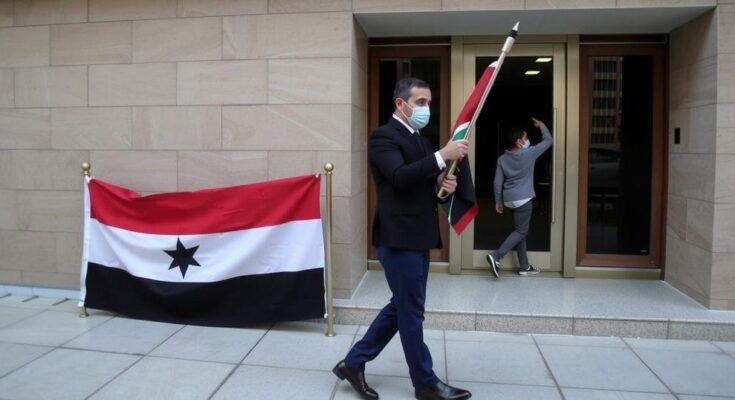Syria’s embassy in Lebanon has paused consular services following the arrest of Bashar Assad’s relatives with forged passports. This suspension coincided with the return of dozens of former Syrian army officers to the new Syrian regime led by Hayat Tahrir al-Sham. The situation reflects changing alliances in the region, amidst ongoing tensions involving Kurdish groups and evolving political dynamics in Syria.
The Syrian embassy in Lebanon has announced a suspension of its consular services following the arrest of relatives of former President Bashar Assad at the Beirut airport for allegedly attempting to use forged passports. This incident occurred just before Lebanese authorities deported a number of Syrian nationals, including former army officers, back to Syria, marking a significant development in Lebanon-Syria relations.
In a statement posted on its Facebook page, the embassy indicated that its services would be halted “until further notice” due to an order from the Syrian foreign ministry. While no reasons were explicitly stated, two anonymous Lebanese security officials suggested that the suspension was related to the suspicion that the passports of Assad’s relatives were forged at the embassy. This situation adds to the complexity of the already tense political environment, as various groups contend for influence and control in the region.
On the same day, around 70 Syrians, including former officers of the Assad regime, were handed over to the new Syrian authorities, now dominated by Hayat Tahrir al-Sham (HTS), formerly an insurgent group. This transfer has occurred amidst reports of growing diplomatic engagements between Syria’s new authorities and other regional powers, signaling a shift in the geopolitical landscape. Delegations from Libya and Bahrain have made official visits to Damascus, implying an intention to normalize relations.
Despite a prevailing atmosphere of unease, HTS leader Ahmad al-Sharaa has reportedly taken measures to alleviate fears regarding potential reprisals against supporters of the previous regime. Nonetheless, clashes with pro-Assad groups persist, alongside ongoing tensions with Kurdish forces in the northeast, who remain wary of HTS’s growing influence and its implications for their rights and security.
Internationally, U.S. Secretary of State Antony Blinken has been engaging with Turkish officials regarding the situation in Syria, emphasizing the importance of a Syrian-led political resolution that honors human rights and fosters inclusivity. Concurrently, demonstrations led by Kurdish women in Hasaka have highlighted the critical need for women’s rights in this evolving political context. Activists like Perishan Ramadan and Rihan Loqo have voiced concerns regarding the new governance, fearing it may perpetuate oppression, particularly regarding women’s roles in society.
The article discusses significant geopolitical changes in Syria and Lebanon, highlighting the complexities surrounding Syria’s new leadership under Hayat Tahrir al-Sham. Following years of civil conflict and the Assad regime’s oppressive rule, the current scenario involves the repatriation of former officials and the suspension of Syrian embassy services in Lebanon. As regional powers seek rapprochement with Syria, the implications for minority rights and international relations are paramount, particularly concerning the tensions between Kurdish groups and the new Syrian authorities who are closely monitored by external actors such as the United States and Turkey.
The suspension of services at Syria’s embassy in Lebanon underscores the volatility of the political situation following the arrests of Assad’s relatives and the subsequent repatriation of Syrian nationals. While regional alliances appear to be shifting towards normalization with Syria’s new regime, underlying tensions, particularly with Kurdish groups, suggest that the path forward will be fraught with challenges. Moreover, the ongoing advocacy for women’s rights amidst these changes indicates a broader struggle within Syrian society for representation and equality.
Original Source: www.independent.co.uk




